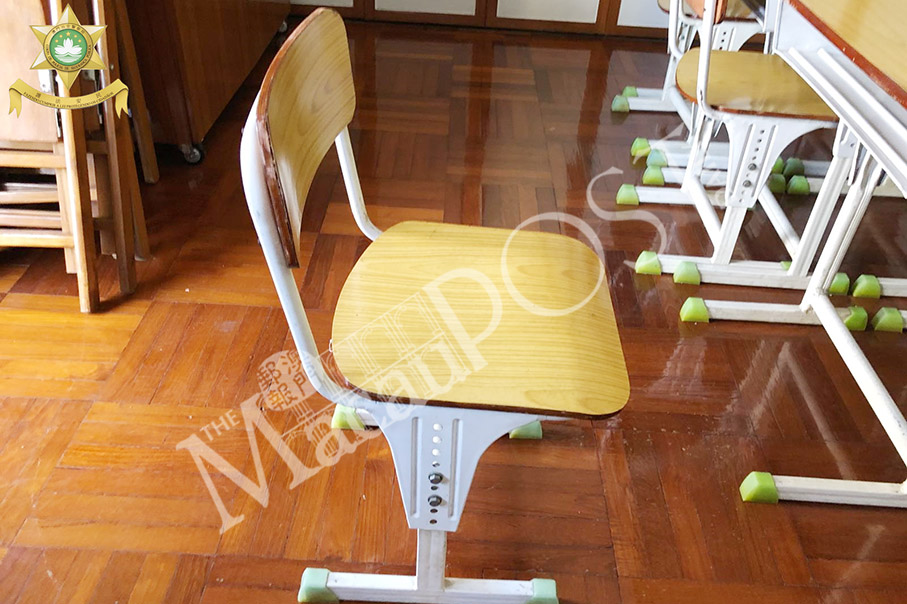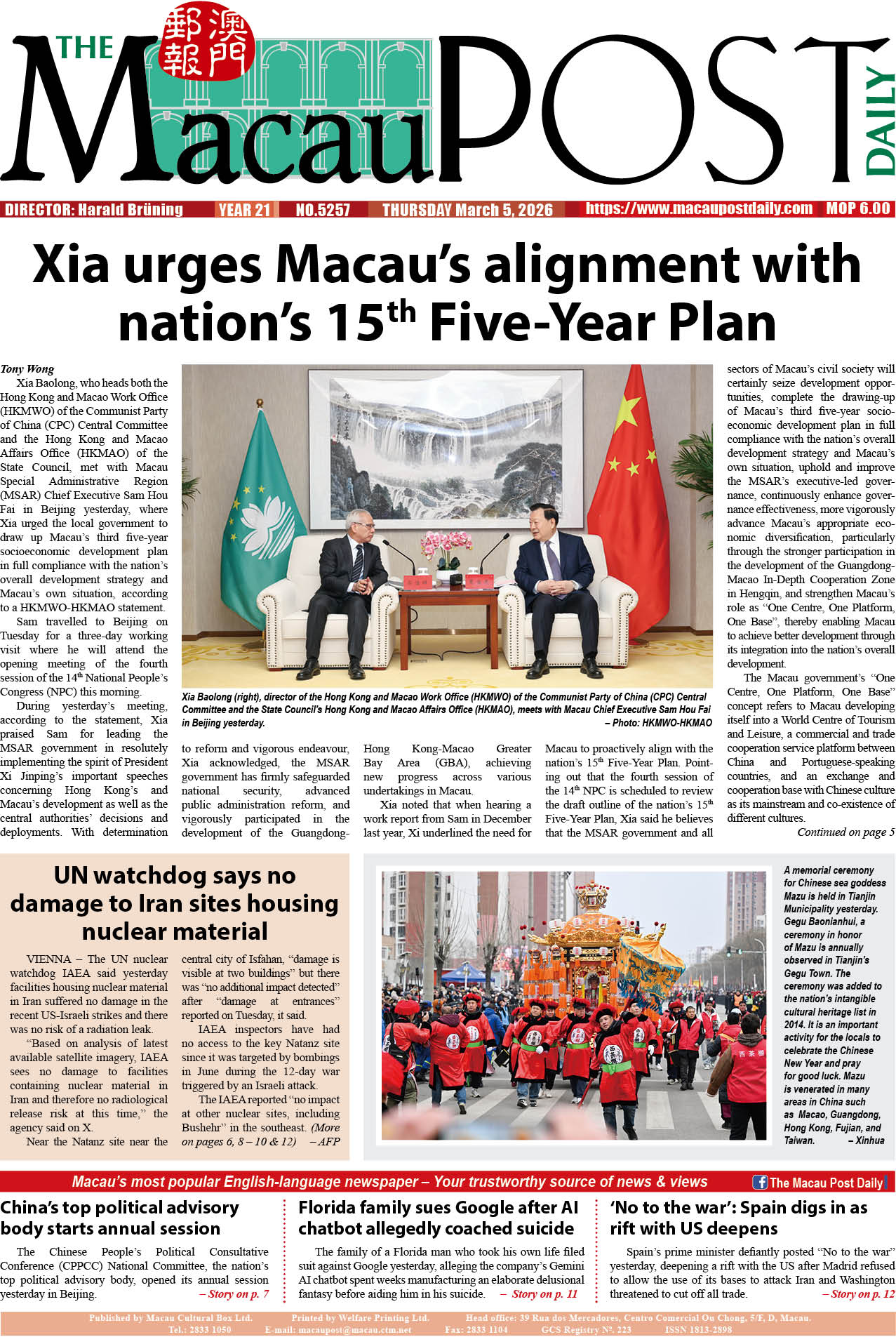Editorial
Press freedom, which is guaranteed by Article 27 of the Macau Basic Law, can only be properly understood in its specific socio-cultural context. In other words, press freedom like all other kinds of freedoms must be put in perspective. Like all rights and duties, also press freedom involves the mutually interdependent aspects of the absolute and the relative. All freedoms have their limits.
Macau’s radio and TV broadcaster TDM, which is owned by the government, is tasked with, among other things, reporting news and presenting public affairs programmes. Occasionally, TDM becomes its own news item, such as in 1992 when a number of its Chinese journalists quit in a row over the abrupt cancellation of a certain radio programme, and recently when a number of its Portuguese journalists resigned over claims that the station was imposing “pro-Beijing” editorial guidelines on them.
News and comments about the case – the details of which depend on who one talks to – went global and resulted in a flood of often rather simplistic and erroneous remarks about press freedom in Macau. Portugal’s Foreign Minister Augusto Santos Silva waded into the issue by telling reporters last week (I am quoting Portugal’s newswire Lusa) that “the Portuguese government hopes and expects that the two sides comply with the Basic Law in all its stipulations”. The minister, a sociologist by profession, obviously mixed up the Basic Law, which is an internal legal instrument of the People’s Republic of China (PRC), with the Sino-Portuguese Joint Declaration on the Question of Macau signed by Lisbon and Beijing in 1987, a historically important document that resulted in Macau’s relatively smooth transfer of administration in 1999. Obviously, with Macau’s reversion from Portuguese to Chinese rule on December 20, 1999, Portugal’s involvement in the “arrangements for the transitional period” (Annex II of the Joint Declaration) in the run-up to the setting-up of the Macau Special Administrative Region (MSAR) came to an end. Ever since what happens in Macau has been an internal matter of the PRC.
Incidentally, the Joint Declaration mentions press freedom twice.
Press freedom is, of course, both absolute and relative. It is absolute as far as journalists’ right and duty to accurate and balanced reporting and editing is concerned. Accuracy (facts, facts, facts!), fairness (listening to both sides of the story) and separating news from views (that’s why our newspaper clearly identifies opinion articles as commentary) are the cornerstones of professional journalism. Of course, journalists do commit mistakes, but errors can – and should –be corrected. As a veteran journalist I am fully aware of the pitfalls of our profession. For instance, a simple typing error that has been overlooked in the editing process can result in a major foul-up. This happens more often than one would hope.
Besides, press freedom does not operate in a value-free environment. Journalism functions within the framework of a specific socio-political system – that is what I would describe as the “relative” aspect of our profession. Therefore, for instance, different countries’ press freedom rules and laws are starkly different, such as in the areas of libel, privacy, opinion privilege, access to places and information, liability for republication, copyright, and national security.
Press freedom is a sensitive plant that requires from all those involved (governments, journalists, readers and viewers) a great deal of tact, sensitivity and, most of all, common sense.
I always remember what a seasoned editor in Hong Kong told me in the 1980s: “As a journalist you must never forget where you work.” At that time I didn’t fully grasp what he wanted to tell me. Years later the truth finally dawned on me. He also told me that it’s wrong for a journalist to be antagonistic for the simple reason that it is counterproductive. I have tried hard to heed his advice ever since.
Moreover, a journalist working for a state broadcaster or government-owned newspaper should know that his or her employment situation and working environment are certainly quite different from his or her colleagues working for a media organisation run by a commercial company or a non-profit entity. I know from my own professional experience that it’s not the same to work for a news agency or a newspaper, even if both are privately owned. Working for a racy tabloid is different from working for a high-brow broadsheet. Besides, each media organisation has its own editorial guidelines and “house style”. I am quite sure that journalists who apply, for example, for a job at CNN or Fox know what kind of editorial guidelines they can expect. They are in the wrong profession if they really don’t know.
That’s why I expect any journalist working for TDM to be aware of the broadcaster’s background. If you don’t like your current media organisation’s editorial guidelines, which may gradually change over the years, move on. Based on its population of about 680,000, Macau has probably the highest “media density” in the world. Of course, we all know that most of Macau’s privately-owned newspapers and magazines aren’t able to pay the salaries that a public broadcaster can afford. But money isn’t everything. Journalism isn’t just a profession. Ultimately, it’s a passion.
I hope that all those who decided to leave TDM will be able to land a new job soon.
Impractical
Meanwhile, quite a few local journalists have told me that they are bewildered by the recent announcement by the Legislative Assembly Election Affairs Commission that the local media must “hide” all their online election campaign articles on the eve of the direct and indirect elections on September 12.
Based on Macau’s mainland European election system, no electioneering is allowed on the day before and on the day of the election.
Frankly, I find the announcement puzzling for the simple reason that the measure’s implementation would be impractical. First of all, Macau’s online media presence remains completely unregulated (unlike its print and broadcasting counterparts) by the government. I always found it nonsensical that while Macau’s print and broadcasting media are strictly regulated by law, digital media are not. The other impracticality resulting from the commission’s announcement is that even if, for instance, our newspaper would “conceal” its election-campaign related articles from its website for the period concerned, virtually all of our news and opinions articles are circulating on many other sites on the internet that are beyond our reach.
That’s why I would like to ask the head of the commission, Tong Hio Fong (a judge by profession), to reconsider his decision as a simple matter of practicality.
However, I think that some of my media colleagues have gone far too far by describing – in an “open letter” – the commission’s announcement as “white terror”. That’s sheer claptrap. We in Macau should not use Hong Kong anti-government radicals’ unhinged jargon that clearly crossed the red line.
In Macau, let’s keep our feet firmly on the ground, especially at a time when a new cold war appears to be on the horizon…
– Harald Brüning







